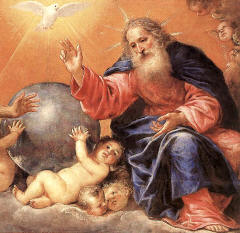Ordinary Time: June 7th
Solemnity of the Most Holy Trinity
Old Calendar: Trinity Sunday
The fundamental dogma, on which everything in Christianity is based, is that of the Blessed Trinity in whose name all Christians are baptized. The feast of the Blessed Trinity needs to be understood and celebrated as a prolongation of the mysteries of Christ and as the solemn expression of our faith in this triune life of the Divine Persons, to which we have been given access by Baptism and by the Redemption won for us by Christ. Only in heaven shall we properly understand what it means, in union with Christ, to share as sons in the very life of God.
The feast of the Blessed Trinity was introduced in the ninth century and was only inserted in the general calendar of the Church in the fourteenth century by Pope John XXII. But the cultus of the Trinity is, of course, to be found throughout the liturgy. Constantly the Church causes us to praise and adore the thrice-holy God who has so shown His mercy towards us and has given us to share in His life.
Trinity Sunday
The dogma of faith which forms the object of the feast is this: There is one God and in this one God there are three Divine Persons; the Father is God, the Son is God, the Holy Spirit is God. Yet there are not three Gods, but one, eternal, incomprehensible God! The Father is not more God than the Son, neither is the Son more God than the Holy Spirit. The Father is the first Divine Person; the Son is the second Divine Person, begotten from the nature of the Father from eternity; the Holy Spirit is the third Divine Person, proceeding from the Father and the Son. No mortal can fully fathom this sublime truth. But I submit humbly and say: Lord, I believe, help my weak faith.
The dogma of faith which forms the object of the feast is this: There is one God and in this one God there are three Divine Persons; the Father is God, the Son is God, the Holy Spirit is God. Yet there are not three Gods, but one, eternal, incomprehensible God! The Father is not more God than the Son, neither is the Son more God than the Holy Spirit. The Father is the first Divine Person; the Son is the second Divine Person, begotten from the nature of the Father from eternity; the Holy Spirit is the third Divine Person, proceeding from the Father and the Son. No mortal can fully fathom this sublime truth. But I submit humbly and say: Lord, I believe, help my weak faith.
Why is this feast celebrated at this particular time? It may be interpreted as a finale to all the preceding feasts. All three Persons contributed to and shared in the work of redemption. The Father sent His Son to earth, for "God so loved the world as to give His only-begotten Son." The Father called us to the faith. The Son, our Savior Jesus Christ, became man and died for us. He redeemed us and made us children of God. He ever remains the liturgist par excellence to whom we are united in all sacred functions. After Christ's ascension the Holy Spirit, however, became our Teacher, our Leader, our Guide, our Consoler. On solemn occasions a thanksgiving Te Deum rises spontaneously from Christian hearts.
 The feast of the Most Holy Trinity may well be regarded as the Church's Te Deum of gratitude over all the blessings of the Christmas and Easter seasons; for this mystery is a synthesis of Christmas, Epiphany, Easter, Ascension and Pentecost. This feast, which falls on the first Sunday after Pentecost, should make us mindful that actually every Sunday is devoted to the honor of the Most Holy Trinity, that every Sunday is sanctified and consecrated to the triune God. Sunday after Sunday we should recall in a spirit of gratitude the gifts which the Blessed Trinity is bestowing upon us. The Father created and predestined us; on the first day of the week He began the work of creation. The Son redeemed us; Sunday is the "Day of the Lord," the day of His resurrection. The Holy Spirit sanctified us, made us His temple; on Sunday the Holy Spirit descended upon the infant Church. Sunday, therefore, is the day of the Most Holy Trinity.
The feast of the Most Holy Trinity may well be regarded as the Church's Te Deum of gratitude over all the blessings of the Christmas and Easter seasons; for this mystery is a synthesis of Christmas, Epiphany, Easter, Ascension and Pentecost. This feast, which falls on the first Sunday after Pentecost, should make us mindful that actually every Sunday is devoted to the honor of the Most Holy Trinity, that every Sunday is sanctified and consecrated to the triune God. Sunday after Sunday we should recall in a spirit of gratitude the gifts which the Blessed Trinity is bestowing upon us. The Father created and predestined us; on the first day of the week He began the work of creation. The Son redeemed us; Sunday is the "Day of the Lord," the day of His resurrection. The Holy Spirit sanctified us, made us His temple; on Sunday the Holy Spirit descended upon the infant Church. Sunday, therefore, is the day of the Most Holy Trinity.
Excerpted from The Church's Year of Grace, Pius Parsch

No comments:
Post a Comment